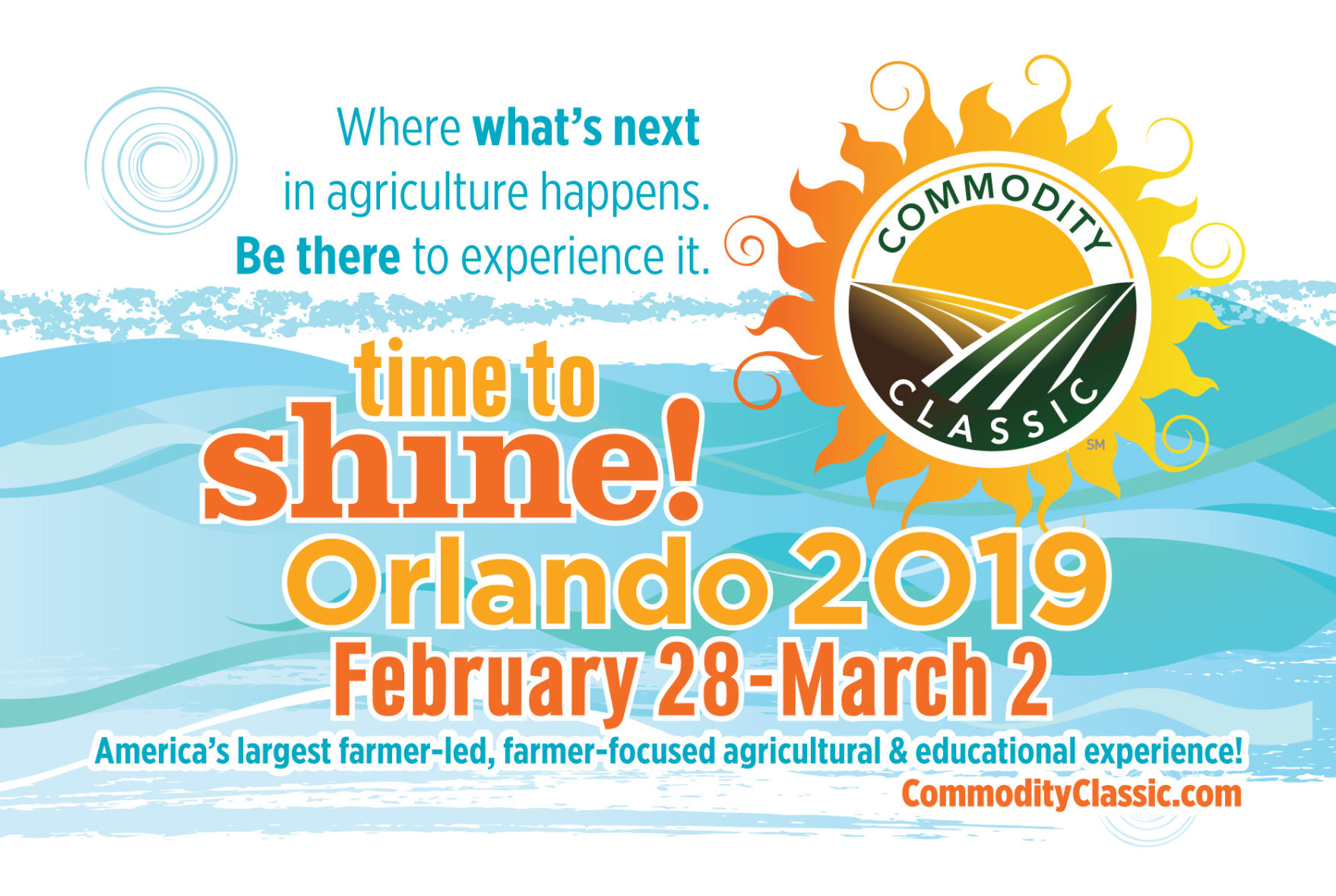We caught up with several leaders of the various commodity groups who will be hard at work at the upcoming Commodity Classic in Orlando, Florida, Feb. 28 to March 2.
Associate Editors Jennifer M. Latzke and Kylene Scott spoke with someone from each group represented at the event—American Soybean Association, National Corn Growers Association, National Association of Wheat Growers and the National Sorghum Producers on the podcast, HPJ Talk. Charles Atkinson, a director of the ASA from Kansas; Wesley Spurlock, past president of the NCGA and current Commodity Classic program committee co-chair; NAWG President Jimmie Musick of Oklahoma and National Sorghum Producers Executive Director, Tim Lust, joined the pair on the podcast.
To listen to the episodes, visit www.hpj.com/podcasts. Atkinson and Musick appear in the Feb. 11 episode, while Lust and Spurlock are in the Feb. 18 episode.
But if you’d rather read what they had to say, here are a few of their thoughts.
Sorghum
Big policy issues Lust sees NSP discussing at Classic are obviously trade and the farm bill implementation. Those two things might consume a lot of their time.
"The board will be putting some final touches on our strategic planning as well and looking out where the organization is headed and industry is headed next 5 to 10 years," Lust said.
It’s also a time for them to come together with the other commodity groups and industry partners.
As for the current state of agriculture, Lust is troubled by current economic conditions and the challenges many are facing on the farm.
"Margins are tough, and certainly sorghum growers have a long history of being a tough group," he said. "But certainly it’s a challenging time in American agriculture; so we can’t lose track of that."
For Lust, trade associations like NSP remain important as they help producers remain profitable and can help them get them through the tough times.
"Whether that’s on legislative activities and farm bills and programs there or maybe it’s regulatory relief," he said. "Relief comes in different packages and looks different."
And that sometimes that means getting rid of a rule that costs money or making it harder to farm.
"Sometimes that’s just keeping a product around that’s maybe a proven product that is $10 to $15 an acre lower cost than what a replacement might be," Lust said. "So certainly spend a lot of time on the regulatory front as well trying to make sure the tools are in the toolbox for growers that they need."
Corn
For Spurlock, besides having the right kinds of tools in their toolbox, corn farmers also need progression on the trade front.
"We need to get U.S., Mexico, Canada trade agreement," Spurlock said. "That needs to go through congress and get ratified so the other countries will ratify it."
Trade is so very important to NCGA and its farmer members.
"Trade is just such an important part of our lives and our market and we’ve got to have this trade," Spurlock said. "The longer this goes on the more market diteriation we’re going to continue to have."
Spurlock sees the outstanding year corn has had as far as exports go and the work the U.S. Grains Council has accomplished.
"They do such a great job around the world of moving and talking to these people and they’ve got boots on the ground all across the world," he said. "And it’s just awfully good to see that."
Ethanol exports are up dramatically.
"We’ve got a few little market problems early," Spurlock said. "We’ve got problems in these countries where—if we’re shipping too much into them or not. So we’re fighting a few battles in that process."
On the policy side, NCGA will take a look at the renewable fuel standard and what it has done for the American corn farmer and farmers in general when it comes to markets.
"We need to continue to hold it as a strong regulation to work with the E15, and EPA," he said. "The president has promised E15 year round, so we’ve got to really watch and hold their feet to the fire."
Soybean
For Atkinson, Classic gives ASA a time to discuss policy and direct staff on which direction discussions need to be taken. Committees will help the process.
The farm bill is also on the top of Atkinson’s mind.
"The biggest thing is we don’t know what all is in that farm bill right now," he said. "We’re working pretty hard on seeing how USDA and some of these other agencies are going to be disseminating that information and getting it back to the producers that’s going to be affecting our soybean producers."
Biotech is another issue on the forefront for soybean producers.
"A lot of our trade issues deal with biotech," Atkinson said.
Crop insurance is another.
"There’s been some talk about possible cuts on crop insurance funding in 2020 and we’re going to be taking a look at that," Atkinson said. "Of course transportation is a big issue we look at with all commodities, and one of them we’re going to be focusing on for the next year is our locks and dams."
Getting infrastructure and shipping methods improved to move grain more efficiently is pretty important as well.
Wheat
Like a couple of the other leaders, Musick is anxious to see if they’ll be able to witness the first measures of implementation of the farm bill.
"We have a new farm bill but very little of it has taken place yet," Musick said. "Getting those procedures out there to the offices and our offices can see exactly what we’ve got."
He’s concerned with the uncertainty and the unknowns, but is looking forward to letting producers know signup periods and times.
“We’re looking forward to them bringing that forward,” Musick said. "And the opportunity to make our commodity, wheat, as well as the other commodities across the countryside, work the best for each and every farmer.’
They’re also trying to find a way to work through some of the conservation regulations and those with EPA that are challenging farmers across the country to grow their crops.
"We’re going to have some discussions on how to clarify with NRCS and some challenges with FSA and implementation," he said. "Different counties interpret those regulations in different ways. So we want to try to clarify those."
Musick has been to a number of Classic’s and still his favorite thing about the "world’s largest indoor farm show" is the opportunity to visit with people from all over the united states."
"That’s the thing about NAWG, we’ve got farmers from every region of the U.S.," he said. "We have a lot of differences and a lot of similarities too. And I’m looking forward to visiting with those farmers."
For more information about Commodity Classic visit www.commodityclassic.com.

